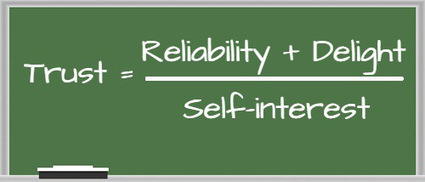Though consumers will show no remorse when it comes to holding companies responsible for unethical or distasteful behavior, they will also proudly advocate and defend the brands that are doing their jobs well. For the past fourteen years, theEdelman Trust Barometer has benchmarked consumer confidence in businesses, media and the government through an annual, global survey of more than 30,000. Respondents are asked to rank brands on how much they trust each institution to do what is right.
Recently, Edelman launched an additionalbrandshare™ survey that seeks to understand the evolving relationship between buyers and brands.
Examining the natural intersection of both studies reveals an important opportunity for businesses to build trust by improving engagement and integrity. But what is trust? Wincko defines trust by the equation “Trust = Reliability + Delight/Self-Interest” as a reminder of the principle’s core components, which are strongly aligned to the findings of the 2014 Edelman Trust Barometer...



 Your new post is loading...
Your new post is loading...









When people are purchasing a product they are also purchasing what the company stands for. The customer trusts that the company is trustworthy and behaving in an ethical manner. The author has conducted research and has found many ways a company can build trust with the customer. He also says that a company doing good for society has become more important to consumers over the years. Consumers believe that companies can be socially responsible without hurting their bottom line. The author says that when a company is defining their social objective, the company has to think about what they stand for. Then they will look at why the consumer will purchase their product, and what is it about our product that has made the company accepted in the marketplace. The article continues with three needs that must be met in order for customers to feel a sense of loyalty to a product. If a business can satisfy these needs of the customer it is likely that the customer will be loyal to the brand and advocate for the brand.
My take away from this article is that once a company has decided their CSR approach all the actions that they take must follow this philosophy. Customers are aware and pay attention to whether a company is living up to their claims. When customers are happy with a company they will promote it and even defend it. To me that mean the customer becomes another form of advertising through word of mouth. This can only increase the company’s bottom line. It is important that a company is aware of how to build trust with their customers and a company needs to take a proactive approach to develop this trust. Once trust is developed, a company wants to be sure to maintain this trust by always staying true to what they claim. I feel this is important because I know personally that I prefer to buy from a company that is socially responsible. I trust that the company is truthful in their claims.
This article discuss how trust is a priority between brands and their stakeholders and how consumers will show no remorse when it comes to holding a company responsible for unethical behaviours but will also defend and advocate for the brands that are doing their jobs well.
The article references the 2014 Edelman Trust Barometer whose studies revealed important opportunities for businesses to build trust by improving engagement and integrity. This study showed that 84% of respondents believe that business can pursue its self-interest while doing good work for the society but if executed poorly, corporate giving can be seen as a distraction from their unethical business practices.
Here are the three ways the articles suggests a company can turn trust into brand advocacy:
Rational Needs – addressed in the form of responding quickly to concerns and complaints
Emotional Needs – fulfilled through transparency about the brand and product development process
Societal Needs – satisfied by confidence that a brand cares about things other than itself, is committed to its community, and belief in a brands core purpose and mission.
I believe that these will all work hand in hand if properly executed and they all need to be part of business procedures in order to turn trust into advocacy. It is very rare to see consumers advocate for brands in most cases they move on to a new one. I believe that if consumers feel that they are part of the brand in some way through the rational, emotional, and societal needs they will feel connected and represented by it.
In the article they state “people don’t just buy products anymore, they buy the companies that make products, the values they represent and what they stand for.” I couldn’t agree with this more. There have been too many instances where companies are doing things that just aren’t right and consumers can’t help but feel responsible because they contributed to that through their purchases.